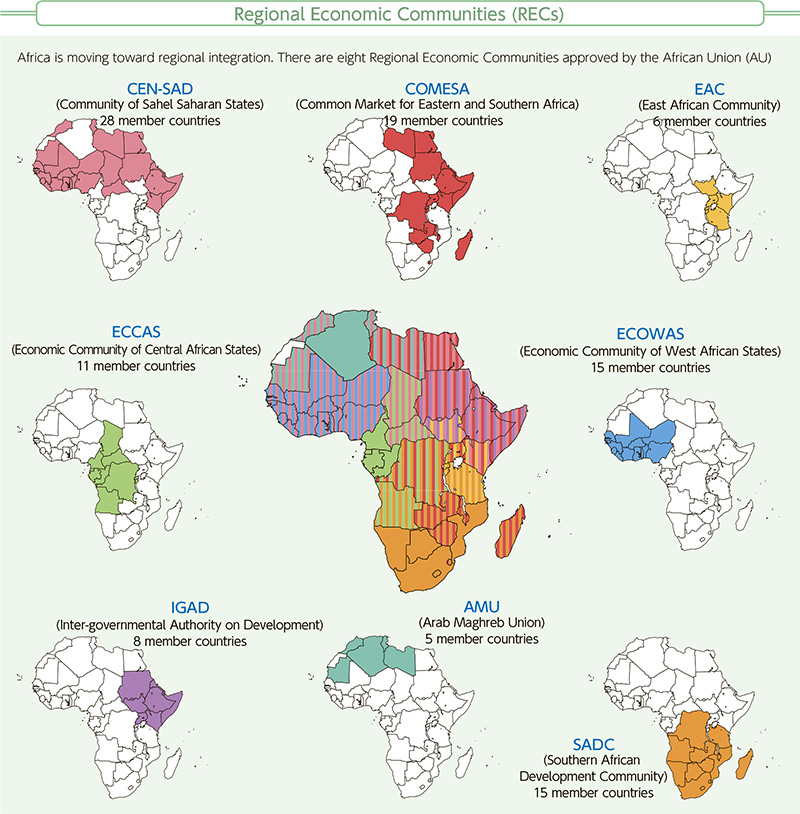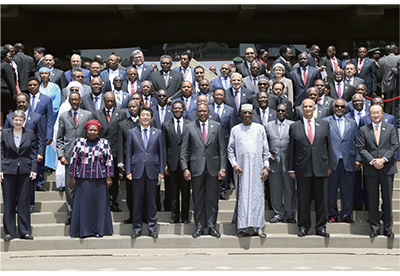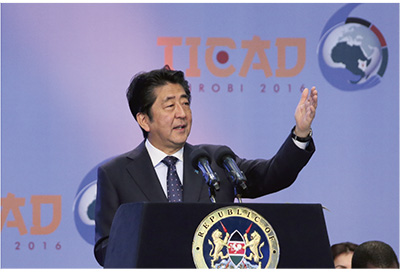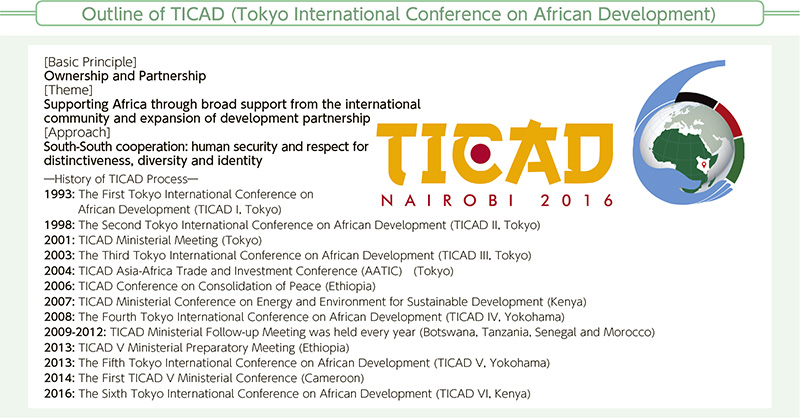Diplomatic Bluebook 2017
Chapter 2
Japan's Foreign Policy that Takes a Panoramic Perspective of the World Map
1.Holding the Sixth Tokyo International Conference on African Development (TICAD VI)
(1) TICAD VI as the core of Japan's diplomacy towards Africa
TICAD is an international forum for African development, co-organized by the UN, UNDP, the World Bank and the African Union Commission (AUC) under the leadership of Japan. TICAD was launched in 1993, under the basic philosophy of “ownership (self-help efforts)” of Africa and “partnership” with the international community including Japan.
While TICAD Summit Meetings were held in Japan once every five years in the past, responding to the recent request from the African side, TICAD Summit Meetings will be held once every three years starting from the sixth summit and be held alternately in Africa and Japan. Therefore, the 6th Tokyo International Conference on African Development (TICAD VI) was held in Nairobi, Kenya, from August 27 to 28, 2016.

 TICAD Ⅵ Group Photograph (August 27, Nairobi, Kenya, Photo: Cabinet Public Relations Office)
TICAD Ⅵ Group Photograph (August 27, Nairobi, Kenya, Photo: Cabinet Public Relations Office) Prime Minister Abe giving a keynote speech at the TICAD VI (August 27, Nairobi, Kenya, Photo: Cabinet Public Relations Office)
Prime Minister Abe giving a keynote speech at the TICAD VI (August 27, Nairobi, Kenya, Photo: Cabinet Public Relations Office)(2) First TICAD Summit Meeting held in Africa in the history of TICAD
The Senior Officials' Meeting (SOM) of the TICAD VI was held in Djibouti in March 2016, and the Preparatory Ministerial Meeting of the TICAD VI was held in Banjul (Gambia) in June 2016. Parliamentary Vice-Minister for Foreign Affairs Mr. Hamachi represented the Government of Japan at the Ministerial Meeting, and discussed on the draft of the outcome document in preparations of TICAD VI.
With regard to TICAD VI which was held in August 2016, over 11,000 people attended the meeting including the side events, and it resulted in the largest conference to date in the history of TICAD. From Japan, Prime Minister Abe attended as the head of delegation and served as the co-chair along with Mr. Uhuru Kenyatta, President of Kenya (the host country), and Mr. Idriss Deby Itno, President of the Republic of Chad (the chairperson of AU).

At TICAD VI, Prime Minister Abe announced at the opening session that Japan would “invest for the future of Africa,” amounting 30 billion dollars in total, when combined with investment from the private sector for a period of three years from 2016 to 2018 by implementing measures such as human resources development to 10 million people (empowerment) by making use of the strength of Japan (quality). This would be done in the priority areas of (1) promoting economic diversification and industrialization, (2) promoting resilient health systems for quality of life, and (3) promoting social stability for shared prosperity. Specifically, with regard to(1) promoting economic diversification and industrialization, in addition to implementing “Quality Infrastructure Investment” of approximately 10 billion US dollars, Japan announced the expansion of the “African Business Education Initiative for Youth (ABE Initiative),” and revealed “ABE Initiative 2.0” which aims at fostering skilled and competent workers in manufacturing and management who can be work-ready personnel. With regard to (2) promoting resilient health systems for quality of life, in order to translate the “G7 Ise-Shima Vision for Global Health” into action in Africa as the outcome of G7 Ise-Shima Summit, Japan has announced to contribute to the realization of “strengthening the capacity for response as well as prevention of and preparedness against public health emergencies” and “promoting universal health coverage (UHC) in Africa” especially through human resource development. Also, Japan, in collaboration with other organizations, launched the “Initiative for Food and Nutrition Security in Africa (IFNA)” in the field of nutrition. With regard to (3) promoting social stability, towards the realization of peace and a stable Africa, Japan announced the provision of support including human resource development to about 9.6 million people including vocational training for 50,000 people and assistance amounting approximately. 500 million US dollars.
Intensive discussion was held at the plenary sessions and the thematic sessions on the initiatives taken by each country in Africa and other regions and the international community, addressing the challenges that emerged after TICAD Ⅴ in 2013, such as the decline in international commodity prices, the vulnerability of the health systems and the rise of violent extremism. In the closing session, the “Nairobi Declaration” and “Nairobi Implementation Plan” was adopted as the TICAD outcome document, based on the discussions in each session.
During TICAD VI, Prime Minister Abe met with 26 African leaders including President Kenyatta of Kenya (the host country) for bilateral or group meetings, while Foreign Minister Kishida met with 10 ministerial level participants from Africa, as well as the heads of seven international organizations in bilateral or group meetings.
The initiatives announced by Japan at TICAD VI and the details of the Nairobi Declaration and its implementation plan will be steadily translated into action by the Government and private sector together with the international community. In particular, the Japanese initiatives announced by Prime Minister Abe are the very first step for Japan to implement the outcomes of the G7 Ise-Shima Summit. Japan will steadily move forward to promote African development and the activities of the private sector in Africa through measures such as the TICAD follow-up mechanism, and by utilizing Japan's excellent science, technologies and innovation.
